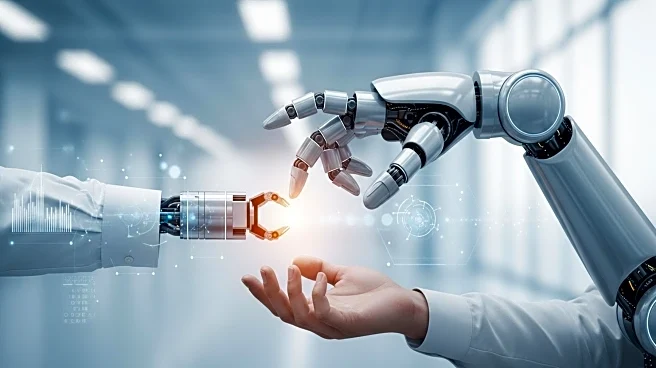What's Happening?
Artificial intelligence is increasingly being integrated into operations at major companies such as Amazon, PayPal, and Microsoft, leading to significant changes in workforce dynamics. AI tools are being utilized to streamline operations, enhance productivity, and reduce labor costs, particularly affecting entry-level and repetitive roles in sectors like customer service, HR, finance, and software development. PayPal's AI assistant, for instance, is reducing the need for customer service calls and live interactions. This shift is contributing to rising unemployment in the tech sector, as roles traditionally filled by humans are being replaced by AI capabilities. Executives often describe these changes as 'restructuring' or 'optimization,' though experts suggest these terms are often euphemisms for AI-driven job cuts.
Why It's Important?
The integration of AI into business operations is reshaping the labor market, with significant implications for employment. While AI enhances efficiency and innovation, it also poses challenges for workers whose skills overlap with AI capabilities, potentially leading to job losses. This trend underscores the need for workers to adapt by acquiring new skills to remain competitive in the evolving job market. Companies may benefit from reduced labor costs and increased productivity, but they also face ethical considerations regarding workforce management and the social impact of AI-driven layoffs.
What's Next?
As AI technology continues to advance, its role in business operations is expected to expand, potentially affecting more sectors and job roles. Companies may need to invest in upskilling programs to help employees transition to new roles that complement AI systems. Additionally, there may be increased pressure on policymakers to address the social and economic impacts of AI-driven workforce changes, including potential regulatory measures to protect affected workers.
Beyond the Headlines
The rise of AI in the workplace raises ethical questions about the balance between technological advancement and human employment. Companies must navigate the complexities of workforce management while considering the long-term societal implications of AI adoption. This includes addressing potential disparities in job opportunities and ensuring equitable access to retraining and upskilling resources.











